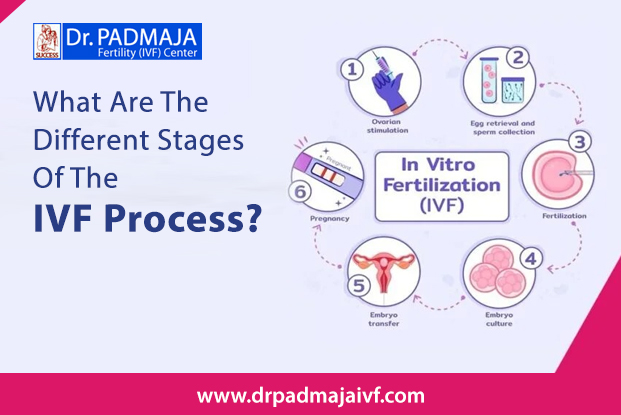In-Vitro Fertilization (IVF) has become a source of hope for couples experiencing infertility issues. The procedure consists of several important stages, each contributing significantly to enhancing the likelihood of a successful pregnancy. If you’re considering IVF treatment, it’s essential to understand these stages and what to expect at each step. For those seeking top-notch fertility care, the best IVF center in Hyderabad, including Dr. Padmaja IVF Center and Dr. Padmaja Fertility Center, offers world-class services and compassionate care.
1. Initial Consultation and Assessment
The first step in the IVF procedure is a comprehensive consultation with a reproductive specialist. During this stage, the doctor assesses the couple’s medical history, conducts physical exams, and recommends specific fertility tests for both partners. Blood tests, hormonal assessments, and ultrasound scans are typically performed to evaluate ovarian reserve, sperm quality, and overall reproductive health. This stage is essential for creating a personalized treatment plan that addresses the couple’s specific needs.
2. Ovarian Stimulation
Ovarian stimulation starts after the treatment plan is decided.The aim is to encourage the ovaries to produce multiple mature eggs instead of the single egg typically released during a natural menstrual cycle. This is accomplished by administering daily hormone injections that include follicle-stimulating hormone (FSH) and luteinizing hormone (LH). During this phase, consistent monitoring is performed via blood tests and ultrasound scans to assess the growth and size of the follicles.
3. Egg Retrieval (Oocyte Retrieval)
When the follicles are optimally mature, the subsequent step is egg retrieval. This procedure is performed under mild sedation or anesthesia to ensure patient comfort. Using a fine needle guided by ultrasound, the fertility specialist extracts the eggs from the ovaries. The procedure takes 20 to 30 minutes. The quality and maturity of the eggs are evaluated in a lab after they are harvested.
4. Sperm Collection and Fertilization
A new sperm sample is taken from a donor or the male partner on the day of egg retrieval. The sperm is subsequently processed to select the healthiest and most motile specimens. Fertilization can take place through conventional insemination, which involves placing the sperm with the eggs in a petri dish, or via Intracytoplasmic Sperm Injection (ICSI), where a single sperm is directly injected into an egg. Dr. Padmaja IVF Center and Dr. Padmaja Fertility Center are known for their precision and expertise in handling this critical stage.
5. Embryo Development
After fertilization, the embryos are meticulously observed in the laboratory over several days. Embryologists evaluate the growth and development of the embryos, choosing the healthiest ones for transfer.This stage is crucial in determining which embryos have the best chance of implantation. Advanced techniques, such as blastocyst culture, allow for better selection of viable embryos.
6. Embryo Transfer
Once the embryos have reached the desired stage of development (typically 3 to 5 days post-fertilization), one or more embryos are transferred into the woman’s uterus. The procedure is relatively simple and painless, often not requiring anesthesia. The fertility specialist uses a thin catheter to place the embryos in the uterus under ultrasound guidance. Clinics like the best IVF center in Hyderabad ensure this procedure is done with utmost care and precision to maximize success rates.
7. Luteal Phase Support
After embryo transfer, the luteal phase begins. Hormonal support, usually in the form of progesterone supplements, is provided to create a nurturing environment in the uterus for embryo implantation. Patients are advised to avoid strenuous activities and stress during this period.
8. Pregnancy Test and Follow-up
Approximately two weeks after the embryo transfer, a blood test is conducted to measure the levels of human chorionic gonadotropin (hCG) — a hormone that indicates pregnancy. If the result is positive, follow-up ultrasounds are scheduled to monitor the pregnancy’s progress. If the test is negative, the fertility specialist may suggest alternative options, such as another IVF cycle or additional tests to refine the treatment plan.
Final Thoughts
The journey through the IVF process can be emotionally and physically demanding, but with the right support, it’s a journey worth taking. Selecting a trustworthy reproductive clinic is an important choice. Hyderabad’s top IVF facility, which includes Dr. Padmaja IVF Center and Dr. Padmaja Fertility Center, provides cutting-edge technology, personalized care, and emotional support to help couples realize their dream of parenthood. Couples can approach the process with confidence and hope for a successful outcome if they are aware of each step of the IVF procedure.
About The Author :

If Dr. Padmaja Divakar is a public figure or a professional in a specific field, I recommend checking her official website, professional profiles, or reliable online sources for the most up-to-date and accurate information about her background, qualifications, and achievements.
Frequently Asked Questions (faqs)
- What is the first step in the IVF process?
The first step involves an initial consultation with a fertility specialist to review your medical history, conduct necessary tests, and create a personalized treatment plan.
- What is ovarian stimulation?
Ovarian stimulation involves taking hormone injections to stimulate the ovaries to produce multiple eggs. This usually lasts 8-14 days.
- How are eggs retrieved during IVF?
Egg retrieval is a minor surgical procedure where mature eggs are collected from the ovaries using a thin needle, guided by ultrasound.
- What happens during fertilization?
After retrieval, the collected eggs are combined with sperm in the lab to create embryos. Fertilization can occur naturally or via ICSI (Intracytoplasmic Sperm Injection).
- What is embryo culture?
During embryo culture, the fertilized eggs (embryos) are grown in a controlled environment for 3-5 days to monitor their development.
- What is embryo transfer?
Embryo transfer is the process of placing one or more healthy embryos into the uterus. This procedure is painless and similar to a Pap smear.
- What is the waiting period after embryo transfer?
A 10-14 day waiting period follows embryo transfer before taking a pregnancy test to determine if the IVF cycle was successful.

